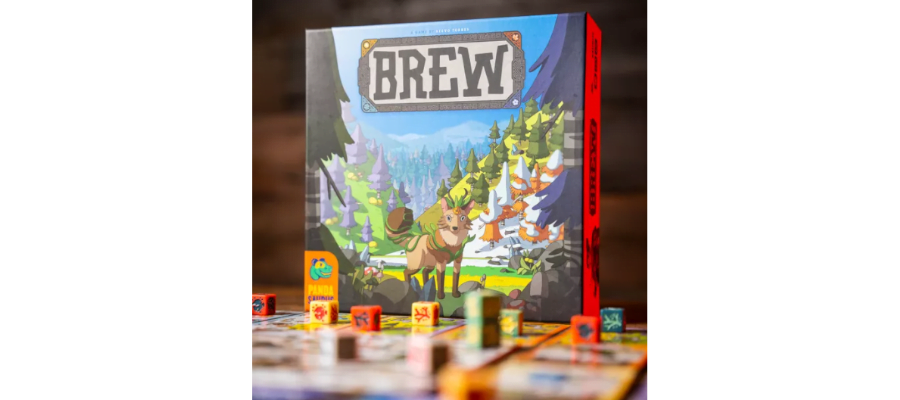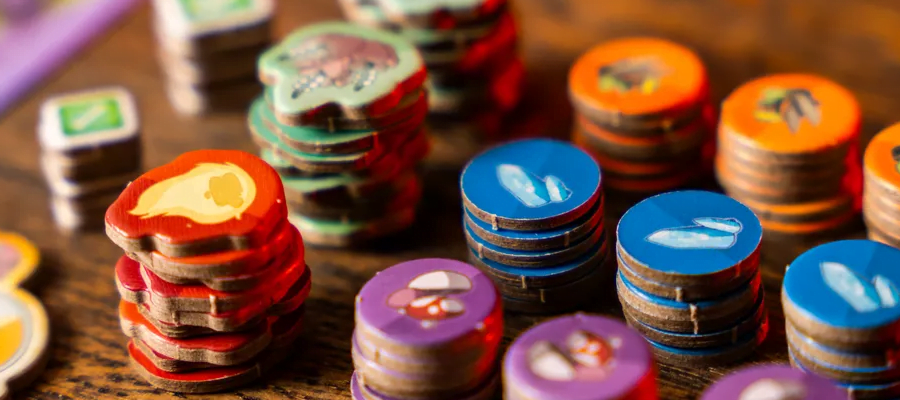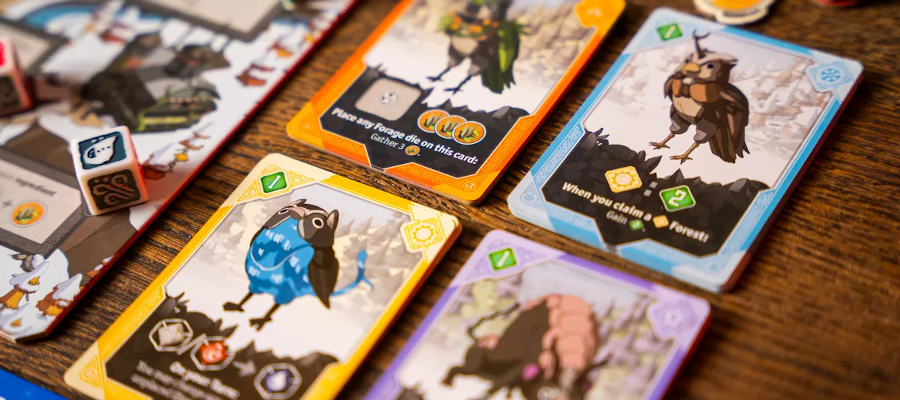Brew is a 2021 game made by Stevo Torres, and published by Pandasaurus Games, who you may recognise from other titles like Machi Koro, Dinosaur Island, The Mind, The Loop, Ctrl and – you know what, Pandasaurus just have a lot of great games in their catalogue. They also have Brew, which doesn’t tend to get that much attention, and that’s where I could do a great job of pivoting to rubbishing on this game, because hey, if they don’t promote it maybe it’s because it’s baaaad.
No, don’t worry about it, I like Brew a lot.
Brew has a really cool premise for its fiction. Something’s gone all messed up with nature, and day, night, and seasons are all happening at the same time and also at random. You represent one of four alchemists in this space, who’s going to travel into the surrounding forests where different seasons are happening, brew potions, tame animals, and get chunks of the forest to Settle The Hell Down for a bit, and all in the name of establishing some control. You can walk from one section of the forest where it’s winter across a line to blazing summer, while you try to find animals that are transformed by these chaotic magics. Along the way, you brew potions that let you perform transformative magics, channelling the energies of the land into safe, stable places.

The winner is the person who gets the most victory points.
I love it, I love that moment when the game spins this fun storybook style context, and then, because it’s really important to give the players a meaningful handle on how to play the game and how to finish the game, it has to pop up that blatant bit of games rules that are completely divorced in their expression from the game fiction.
Mechanically, the game has a nice, clipped, sensible pace. Every turn, you’re going to place one of your six dice, and that’s going to represent you going foraging, or tapping elemental energies, or spending time in the village. This simple action economy does have a bunch of ways it can get more intricate (when you add pets to your options), but basically, you’re going to clip through your turn pretty quickly. There’s a classic worker placement style game system here, too, where your placing dice ties that slot up, meaning other players can’t do that.
The main way you interact with players is cutting away their options on your turn. You can take pets people want, you can occupy slots they want, you can brew potions they want, and that’s the main thing you can do to interact with them. Main thing. There’s also the way you uh, can burn down their squares if you have access to fire elemental dice, or pets that let you do that.
It’s a nice little system, lots of little interacting, integrated pieces, that’s exciting. I like that kind of system, and mechanically, playing the game, I have almost no complaints about the game that I get to play. I’ve seen complaints about it, the way that the game looks cute and sweet and nice, and kid-friendly, but the game mechanics are a bit mean, with some degree of take-that mechanics where you can deprive one another of resources or fight over worker placement, but I find that a bit of weak soup. Mean games shouldn’t have some kind of aesthetic boundary that demands the way they operate, all that.
And this game looks good! The beasties are interesting looking, though not quite perfectly adorable; they’re interesting, hybrid creatures with weirdo magical elements to them as well. The potions look tasty, the ingredients are intriguing, and the dice are all made to have a pleasant, hefty clack to them, which makes rolling them satisfying and placing them has a nice finality to them as well.

Don’t worry, though, there’s something to complain about.
This game’s rulebook is well written, with sections repeating specific rules right at the point where they come up, which means you get them in both the general and in the specific. The creatures are all written up with rules clarifications to make sure that you mostly get the right information if you’re curious and need to double check something. The font of the rules is good, too!
And then the complaint comes up.
This game, which I will repeat, is a game I like, has a dreadful interface. All the text is just a little bit too small, and in spaces where they don’t have to be that small. The font for the victory point numbers are similar enough that at distance, 9s and 7s can look alike, and 3s and 7s can look alike, 6s and 8s, too. For potions, which live in your hand, where you can bring them up and look at them up close, that’s fine, but the rules text on the creatures that live in a marketplace, that’s super annoying.
But it doesn’t just extend to the text on those cards; the tokens that represent resources, which are flat printed cardboard (thank you, thanks for not giving me a bunch of plastic tokens), but the image on the tokens are shrunk down, away from the border, meaning that the fine detail on the art of that icon are too small. The iconography on the game cards, like the symbol for say, ‘spending a resource of this type’? They’re so small, and vague!

It’s interesting, too, because gameplay interface is the primary way you grapple with the game. It means that getting started in the game, engaging with this fiction and learning how the systems works, is really good in the rulebook, but then the game pieces that are maintaining that game state while you are learning it do things that make that information hard to manage.
It’s not very procedural, either! These rules are specific and have all sorts of interesting, unique pieces that mean the gameplay experience is varied, even as it moves between two basic boundaries of the best and worst ways the game can work! But it’s shocking how for all of the care and thought that was put into the ways the game works as a game, the way you engage with that game has this big, wonky problem.
It’s worse because it’s a problem you’re going to stop seeing if you play the game enough! It’s normally something I associate with a lack of playtesting or professional editing, neither of which I’d expect in this case.
Anyway, Brew. Great little game, you can be friends with a badger frog.
All images sourced from the BoardgameGeek page on Brew